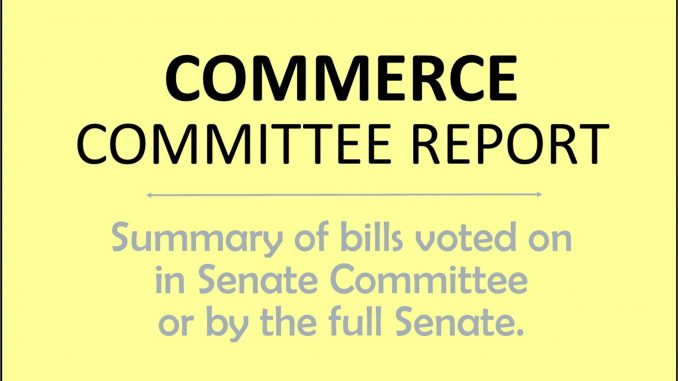
SF 331 – Filing requirements for energy efficiency reports
SF 355 – Municipal utility service disconnection, discontinuation regulations
SF 404 – Experimental treatments
SF 409 – Credit Union omnibus
HF 303 – Update to pre-need funeral, cemetery receivership requirements
FLOOR ACTION
SF 331 streamlines federal and state energy efficiency reporting by giving electric cooperatives the option of filing their mandatory annual federal report (Form EIA-861) with the Iowa Utilities Board to fulfill the state energy efficiency reporting requirements. This eliminates duplication and reduces regulatory costs. The Iowa Association of Electric Cooperatives estimates a collective savings of $75,000 to $100,000 annually for cooperatives statewide. The bill does not change the requirement that electric cooperatives offer energy efficiency programs to their member-owners, or that the data and information about energy efficiency programs be reported.
[3/9: 48-0 (Anderson, Bertrand excused)]
SF 355 modifies the terminology throughout Code section 384.84(3), which relates to discontinuing services by municipally-owned utilities, by including the disconnection of services. Currently, Code section 476.1B provides that a municipally owned utility is not subject to regulation by the Iowa Utilities Board, except in specified instances, including disconnection of service. This board authority to establish rules relating to deposits, which may be required by a utility for the initiation or reinstatement of service, would not apply to municipal utilities. Current Code section 476.20(5) requires the board to establish uniform rules for public utilities with respect to deposits required for the initiation or reinstatement of service. The bill provides that this would not apply to municipal utilities, which are governed by the provisions of Code section 384.84, and that municipal utilities are not subject to the board’s rules regarding deposits and payment plans for delinquent amounts owed and repayment of past-due debt. A city utility may require a deposit not exceeding the usual cost of 60 days of gas and electric service.
[3/9: 48-0 (Anderson, Bertrand excused)]
SF 404 relates to the use of experimental treatments for terminally-ill patients. Also known as the “Right to Try” bill, it allows manufacturers of investigational drugs, biological products or devices to make available, and eligible patients with terminal illnesses to attempt treatment with, an investigational drug, biological product or device, as long as they provide written informed consent. An eligible patient’s physician must acknowledge that the patient’s illness is terminal and recommend the patient try an investigational drug, biological product or device. The patient’s written informed consent must acknowledge that treatments currently approved by the U.S. Food & Drug Administration are unlikely to prolong the patient’s life. It must identify the specific treatment sought and the potential best, worst and expected results from the treatment. It must acknowledge that the patient’s insurance is not required to pay for the treatment and that any hospice service may refuse to accept the patient after receiving the treatment. It must also acknowledge that expenses will be credited to the patient, including the patient’s estate, unless otherwise stated in an agreement with the manufacturer. If the patient dies during treatment, the patient’s heirs are not liable for any remaining debts unless otherwise required by law.
The manufacturer may charge an eligible patient or provide the treatment free of charge. Governmental entities are not required to pay costs associated with the use, care or treatment of a patient with an investigational drug, biological product or device. The bill does not require hospitals licensed under Code chapter 135B or other health care facilities to provide new or additional services. Consistent with existing law, the Board of Medicine cannot take an adverse action against a physician’s license solely for recommending an investigational drug, biological product or device for the physician’s eligible patient. The bill does not create a new private cause of action against any person or entity involved in the care of an eligible patient for any harm done to the patient resulting from the treatment if the person or entity is complying in good faith with the terms of the bill and has exercised reasonable care.
[3/14: 49-0 (Horn excused)]
SF 409 is a recommendation by the Iowa Credit Union Division in the Iowa Department of Commerce. It makes technical changes and conforms the statute to current Division practice.
It adds language to Code section 533.113 regarding exam confidentiality to codify what has been noted on each examination report for many years. These additions, along with the penalty provision, will make the language printed on the examination report enforceable. In addition, the Division has formalized a process for authorizing the delivery of examination reports to authorized third parties, such as auditors, the Federal Home Loan Bank and potential merger partners, via the completion of a confidentiality agreement by all parties.
Current law provides for both a meeting of the board of directors after receiving the report of examination and whenever the superintendent deems it necessary and advisable. Recognizing there may be circumstances where the superintendent finds it necessary to call a meeting not directly related to an examination, the Division’s Assistant Attorney General advised the Division to move this provision from the examination section to a section calling for a meeting of the board. Subsections 4 and 7 from section 533.113 are combined in new section 533.113A, and those subsections are deleted from section 533.113.
[3/9: 48-0 (Anderson, Bertrand excused)]
HF 303 (SF 232) is a recommendation by the Iowa Insurance Division (IID). It allows the Insurance Commissioner to notify the Iowa Attorney General of a potential need for a receivership for both a pre-need seller of cemetery and funeral merchandise or funeral services and for a cemetery itself. This eliminates the red tape of meeting a list of requirements in those situations where the pre-need seller or cemetery has consented to a receivership, and allows the Commissioner to move more quickly to protect the remaining funds held by either the pre-need seller or cemetery.
[3/13: 49-0 (Bertrand excused)]
